SBM3204 Reflection Report: Regulations, Ethics, and CSR in Business
VerifiedAdded on 2022/11/26
|8
|1690
|88
Report
AI Summary
This report is a student's self-reflection on the course SBM3204, focusing on sustainability and ethics in a business context. It demonstrates an understanding of regulations, laws, and business ethics within organizations, exploring how these elements are interconnected and influence business practices. The report further examines organizational values and their role in ethical decision-making, highlighting the impact of social and public pressures on ethical behavior. It identifies and analyzes potential ethical dilemmas, offering strategies for effective responses. Finally, the report emphasizes the importance of corporate social responsibility (CSR), both internally and in stakeholder communications, and how it shapes an organization's values and reputation. The reflection connects learning outcomes to specific aspects of the business environment, supporting statements with examples and critical analysis.
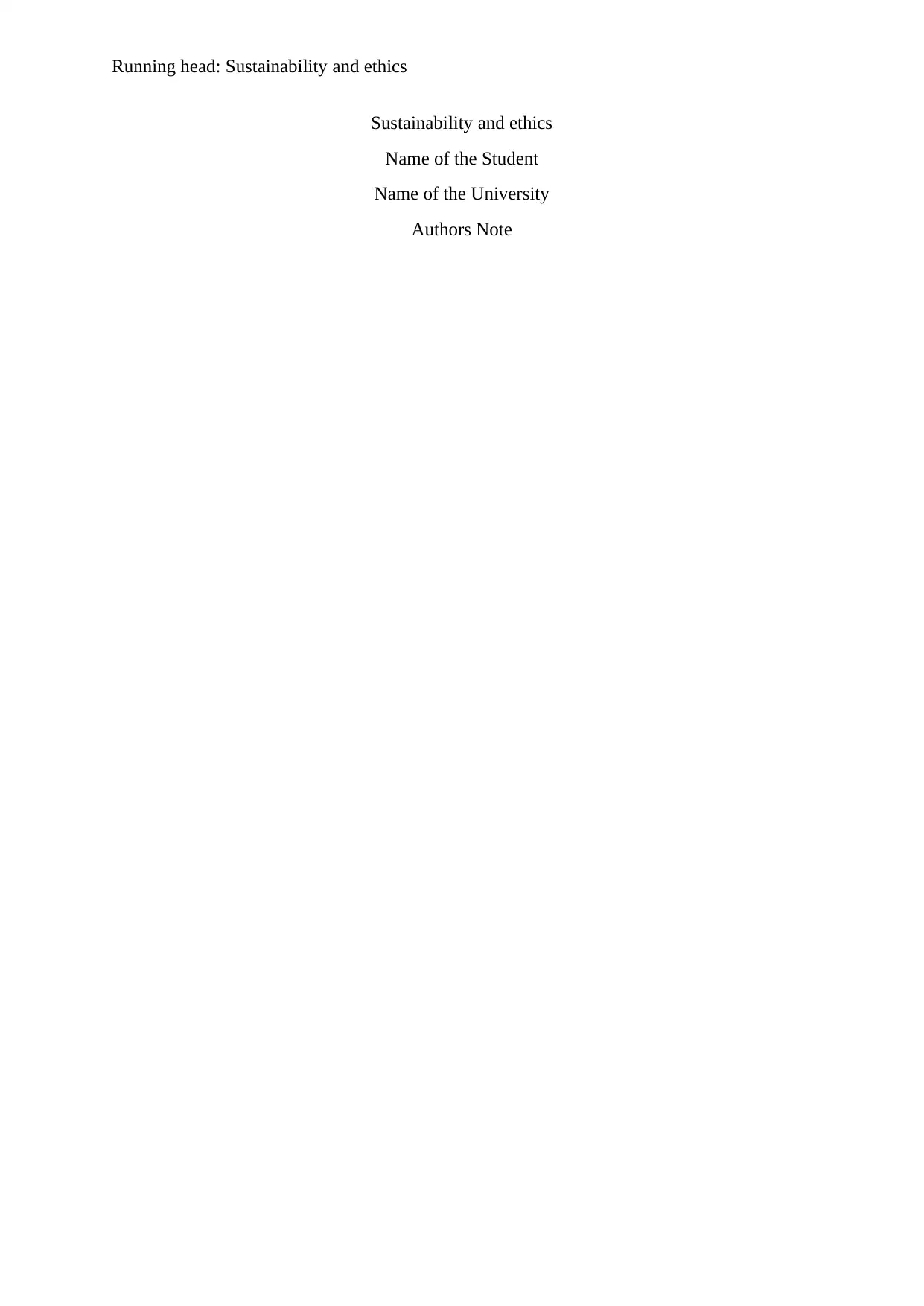
Running head: Sustainability and ethics
Sustainability and ethics
Name of the Student
Name of the University
Authors Note
Sustainability and ethics
Name of the Student
Name of the University
Authors Note
Paraphrase This Document
Need a fresh take? Get an instant paraphrase of this document with our AI Paraphraser
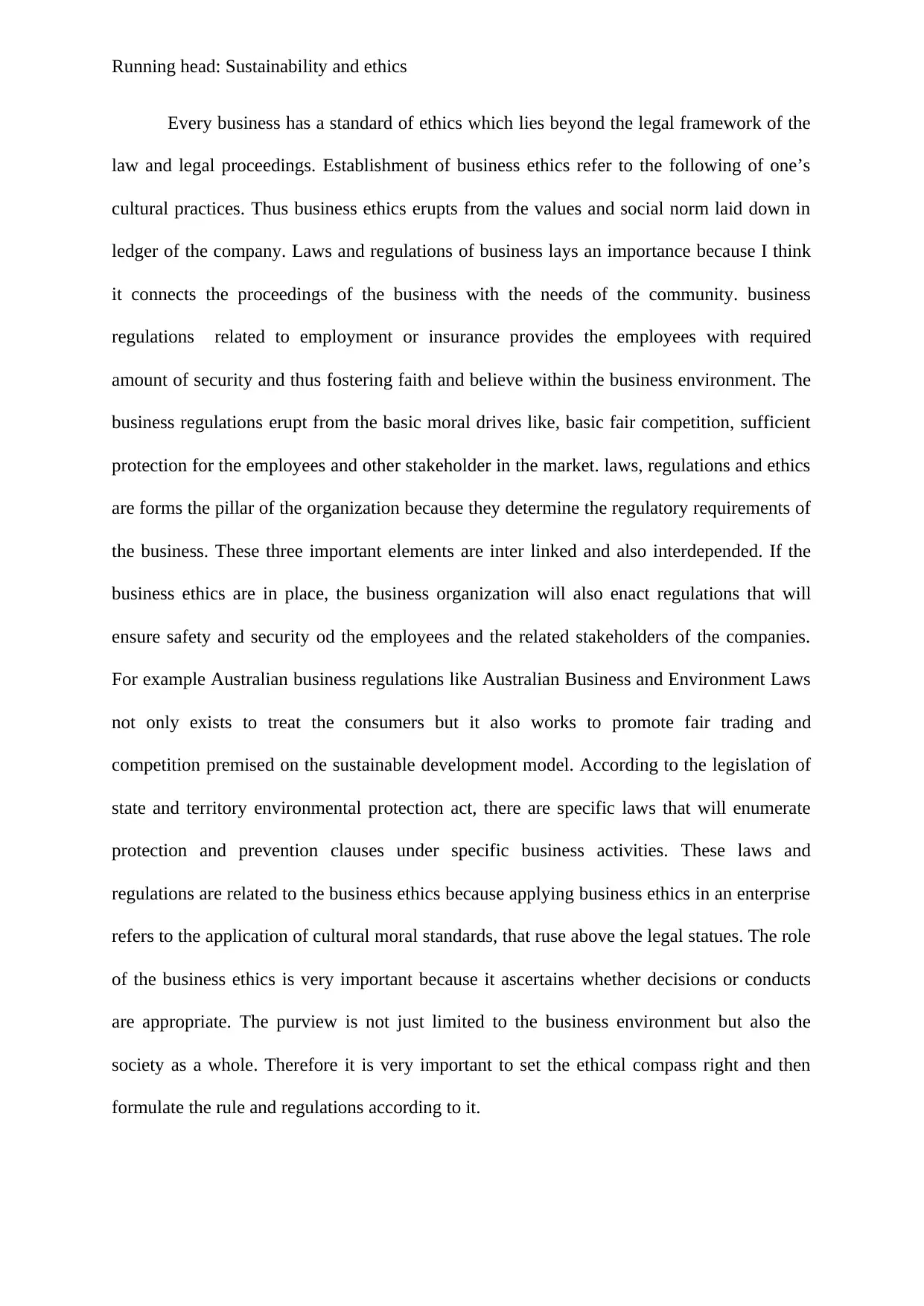
Running head: Sustainability and ethics
Every business has a standard of ethics which lies beyond the legal framework of the
law and legal proceedings. Establishment of business ethics refer to the following of one’s
cultural practices. Thus business ethics erupts from the values and social norm laid down in
ledger of the company. Laws and regulations of business lays an importance because I think
it connects the proceedings of the business with the needs of the community. business
regulations related to employment or insurance provides the employees with required
amount of security and thus fostering faith and believe within the business environment. The
business regulations erupt from the basic moral drives like, basic fair competition, sufficient
protection for the employees and other stakeholder in the market. laws, regulations and ethics
are forms the pillar of the organization because they determine the regulatory requirements of
the business. These three important elements are inter linked and also interdepended. If the
business ethics are in place, the business organization will also enact regulations that will
ensure safety and security od the employees and the related stakeholders of the companies.
For example Australian business regulations like Australian Business and Environment Laws
not only exists to treat the consumers but it also works to promote fair trading and
competition premised on the sustainable development model. According to the legislation of
state and territory environmental protection act, there are specific laws that will enumerate
protection and prevention clauses under specific business activities. These laws and
regulations are related to the business ethics because applying business ethics in an enterprise
refers to the application of cultural moral standards, that ruse above the legal statues. The role
of the business ethics is very important because it ascertains whether decisions or conducts
are appropriate. The purview is not just limited to the business environment but also the
society as a whole. Therefore it is very important to set the ethical compass right and then
formulate the rule and regulations according to it.
Every business has a standard of ethics which lies beyond the legal framework of the
law and legal proceedings. Establishment of business ethics refer to the following of one’s
cultural practices. Thus business ethics erupts from the values and social norm laid down in
ledger of the company. Laws and regulations of business lays an importance because I think
it connects the proceedings of the business with the needs of the community. business
regulations related to employment or insurance provides the employees with required
amount of security and thus fostering faith and believe within the business environment. The
business regulations erupt from the basic moral drives like, basic fair competition, sufficient
protection for the employees and other stakeholder in the market. laws, regulations and ethics
are forms the pillar of the organization because they determine the regulatory requirements of
the business. These three important elements are inter linked and also interdepended. If the
business ethics are in place, the business organization will also enact regulations that will
ensure safety and security od the employees and the related stakeholders of the companies.
For example Australian business regulations like Australian Business and Environment Laws
not only exists to treat the consumers but it also works to promote fair trading and
competition premised on the sustainable development model. According to the legislation of
state and territory environmental protection act, there are specific laws that will enumerate
protection and prevention clauses under specific business activities. These laws and
regulations are related to the business ethics because applying business ethics in an enterprise
refers to the application of cultural moral standards, that ruse above the legal statues. The role
of the business ethics is very important because it ascertains whether decisions or conducts
are appropriate. The purview is not just limited to the business environment but also the
society as a whole. Therefore it is very important to set the ethical compass right and then
formulate the rule and regulations according to it.
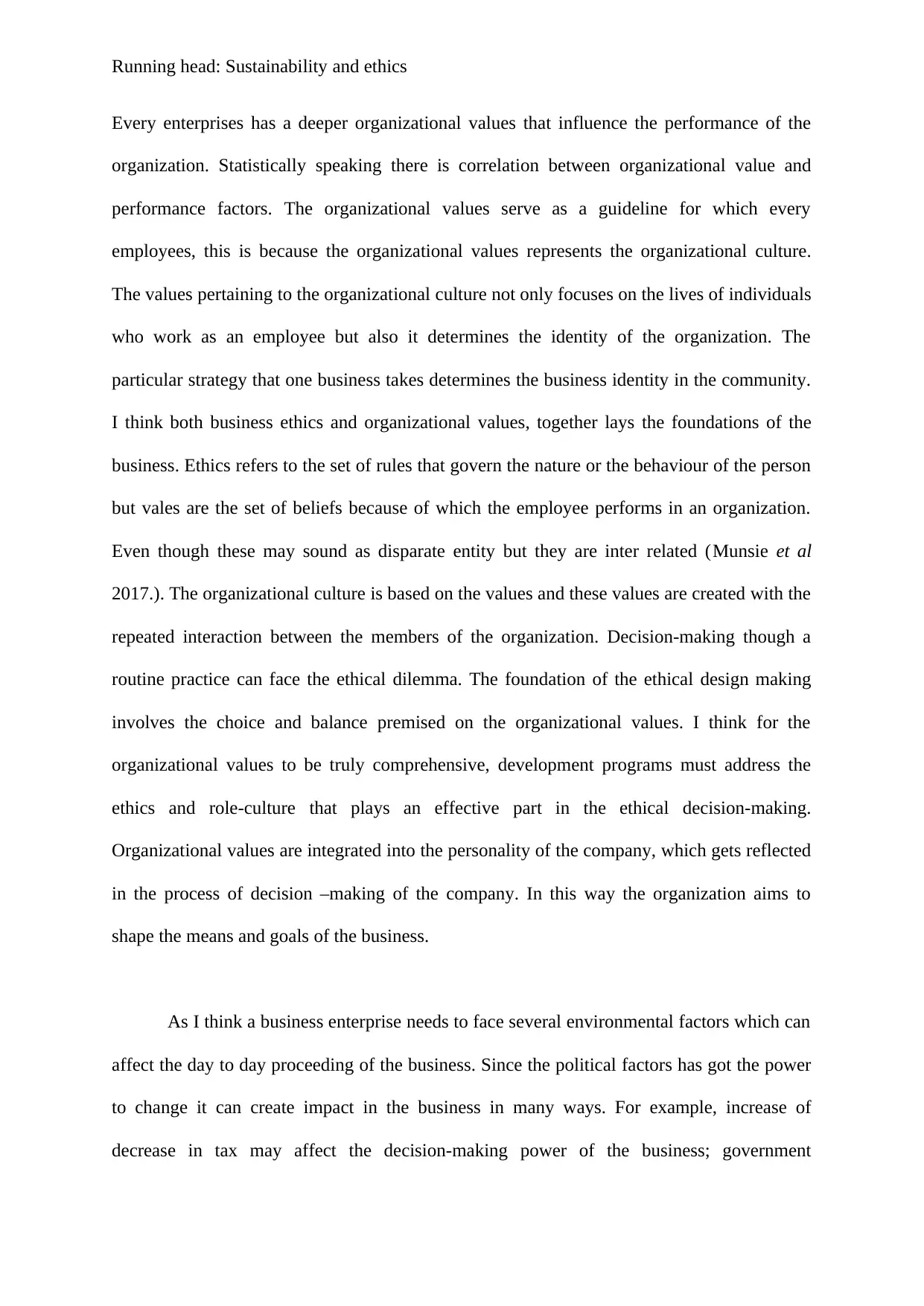
Running head: Sustainability and ethics
Every enterprises has a deeper organizational values that influence the performance of the
organization. Statistically speaking there is correlation between organizational value and
performance factors. The organizational values serve as a guideline for which every
employees, this is because the organizational values represents the organizational culture.
The values pertaining to the organizational culture not only focuses on the lives of individuals
who work as an employee but also it determines the identity of the organization. The
particular strategy that one business takes determines the business identity in the community.
I think both business ethics and organizational values, together lays the foundations of the
business. Ethics refers to the set of rules that govern the nature or the behaviour of the person
but vales are the set of beliefs because of which the employee performs in an organization.
Even though these may sound as disparate entity but they are inter related (Munsie et al
2017.). The organizational culture is based on the values and these values are created with the
repeated interaction between the members of the organization. Decision-making though a
routine practice can face the ethical dilemma. The foundation of the ethical design making
involves the choice and balance premised on the organizational values. I think for the
organizational values to be truly comprehensive, development programs must address the
ethics and role-culture that plays an effective part in the ethical decision-making.
Organizational values are integrated into the personality of the company, which gets reflected
in the process of decision –making of the company. In this way the organization aims to
shape the means and goals of the business.
As I think a business enterprise needs to face several environmental factors which can
affect the day to day proceeding of the business. Since the political factors has got the power
to change it can create impact in the business in many ways. For example, increase of
decrease in tax may affect the decision-making power of the business; government
Every enterprises has a deeper organizational values that influence the performance of the
organization. Statistically speaking there is correlation between organizational value and
performance factors. The organizational values serve as a guideline for which every
employees, this is because the organizational values represents the organizational culture.
The values pertaining to the organizational culture not only focuses on the lives of individuals
who work as an employee but also it determines the identity of the organization. The
particular strategy that one business takes determines the business identity in the community.
I think both business ethics and organizational values, together lays the foundations of the
business. Ethics refers to the set of rules that govern the nature or the behaviour of the person
but vales are the set of beliefs because of which the employee performs in an organization.
Even though these may sound as disparate entity but they are inter related (Munsie et al
2017.). The organizational culture is based on the values and these values are created with the
repeated interaction between the members of the organization. Decision-making though a
routine practice can face the ethical dilemma. The foundation of the ethical design making
involves the choice and balance premised on the organizational values. I think for the
organizational values to be truly comprehensive, development programs must address the
ethics and role-culture that plays an effective part in the ethical decision-making.
Organizational values are integrated into the personality of the company, which gets reflected
in the process of decision –making of the company. In this way the organization aims to
shape the means and goals of the business.
As I think a business enterprise needs to face several environmental factors which can
affect the day to day proceeding of the business. Since the political factors has got the power
to change it can create impact in the business in many ways. For example, increase of
decrease in tax may affect the decision-making power of the business; government
⊘ This is a preview!⊘
Do you want full access?
Subscribe today to unlock all pages.

Trusted by 1+ million students worldwide
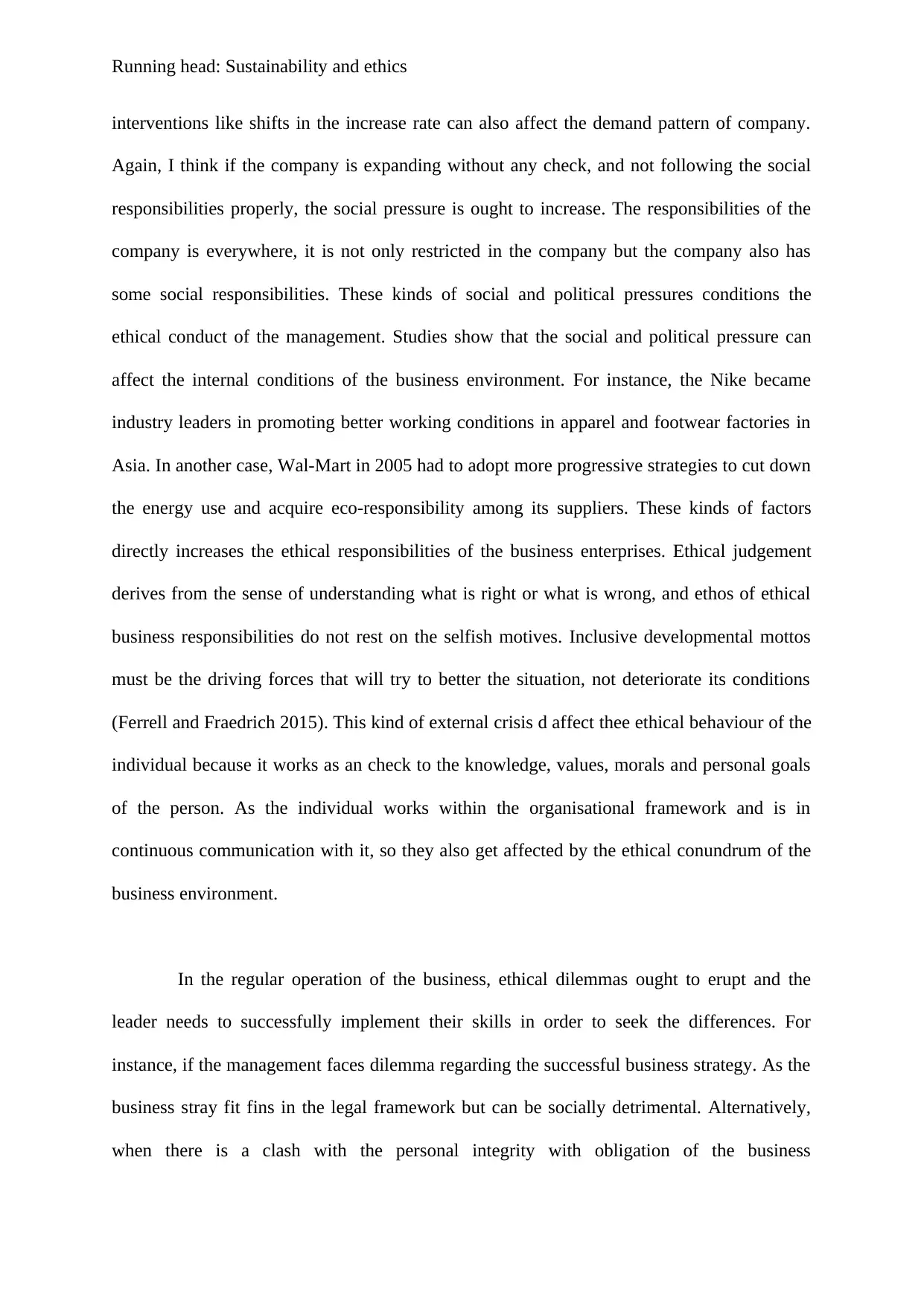
Running head: Sustainability and ethics
interventions like shifts in the increase rate can also affect the demand pattern of company.
Again, I think if the company is expanding without any check, and not following the social
responsibilities properly, the social pressure is ought to increase. The responsibilities of the
company is everywhere, it is not only restricted in the company but the company also has
some social responsibilities. These kinds of social and political pressures conditions the
ethical conduct of the management. Studies show that the social and political pressure can
affect the internal conditions of the business environment. For instance, the Nike became
industry leaders in promoting better working conditions in apparel and footwear factories in
Asia. In another case, Wal-Mart in 2005 had to adopt more progressive strategies to cut down
the energy use and acquire eco-responsibility among its suppliers. These kinds of factors
directly increases the ethical responsibilities of the business enterprises. Ethical judgement
derives from the sense of understanding what is right or what is wrong, and ethos of ethical
business responsibilities do not rest on the selfish motives. Inclusive developmental mottos
must be the driving forces that will try to better the situation, not deteriorate its conditions
(Ferrell and Fraedrich 2015). This kind of external crisis d affect thee ethical behaviour of the
individual because it works as an check to the knowledge, values, morals and personal goals
of the person. As the individual works within the organisational framework and is in
continuous communication with it, so they also get affected by the ethical conundrum of the
business environment.
In the regular operation of the business, ethical dilemmas ought to erupt and the
leader needs to successfully implement their skills in order to seek the differences. For
instance, if the management faces dilemma regarding the successful business strategy. As the
business stray fit fins in the legal framework but can be socially detrimental. Alternatively,
when there is a clash with the personal integrity with obligation of the business
interventions like shifts in the increase rate can also affect the demand pattern of company.
Again, I think if the company is expanding without any check, and not following the social
responsibilities properly, the social pressure is ought to increase. The responsibilities of the
company is everywhere, it is not only restricted in the company but the company also has
some social responsibilities. These kinds of social and political pressures conditions the
ethical conduct of the management. Studies show that the social and political pressure can
affect the internal conditions of the business environment. For instance, the Nike became
industry leaders in promoting better working conditions in apparel and footwear factories in
Asia. In another case, Wal-Mart in 2005 had to adopt more progressive strategies to cut down
the energy use and acquire eco-responsibility among its suppliers. These kinds of factors
directly increases the ethical responsibilities of the business enterprises. Ethical judgement
derives from the sense of understanding what is right or what is wrong, and ethos of ethical
business responsibilities do not rest on the selfish motives. Inclusive developmental mottos
must be the driving forces that will try to better the situation, not deteriorate its conditions
(Ferrell and Fraedrich 2015). This kind of external crisis d affect thee ethical behaviour of the
individual because it works as an check to the knowledge, values, morals and personal goals
of the person. As the individual works within the organisational framework and is in
continuous communication with it, so they also get affected by the ethical conundrum of the
business environment.
In the regular operation of the business, ethical dilemmas ought to erupt and the
leader needs to successfully implement their skills in order to seek the differences. For
instance, if the management faces dilemma regarding the successful business strategy. As the
business stray fit fins in the legal framework but can be socially detrimental. Alternatively,
when there is a clash with the personal integrity with obligation of the business
Paraphrase This Document
Need a fresh take? Get an instant paraphrase of this document with our AI Paraphraser
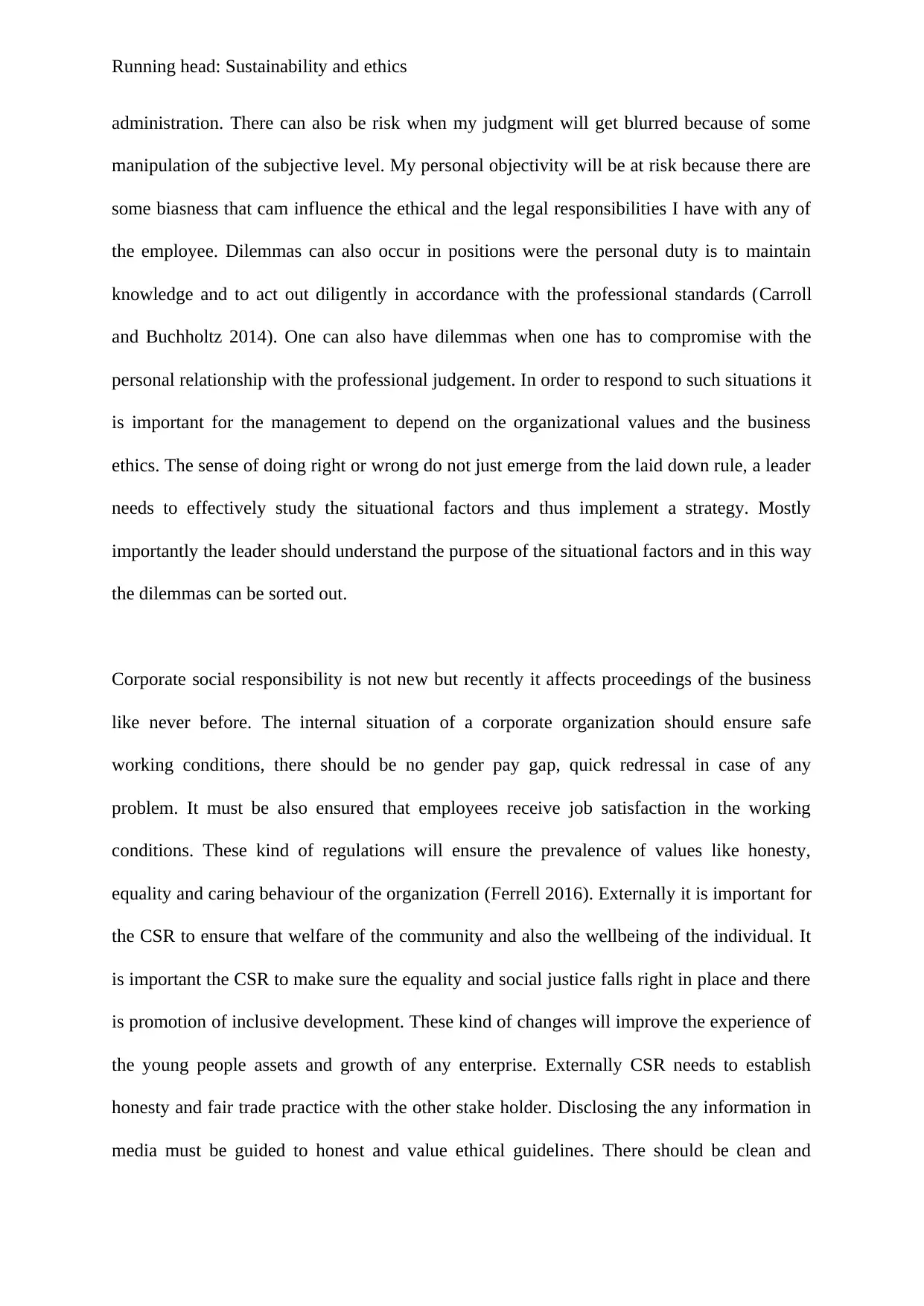
Running head: Sustainability and ethics
administration. There can also be risk when my judgment will get blurred because of some
manipulation of the subjective level. My personal objectivity will be at risk because there are
some biasness that cam influence the ethical and the legal responsibilities I have with any of
the employee. Dilemmas can also occur in positions were the personal duty is to maintain
knowledge and to act out diligently in accordance with the professional standards (Carroll
and Buchholtz 2014). One can also have dilemmas when one has to compromise with the
personal relationship with the professional judgement. In order to respond to such situations it
is important for the management to depend on the organizational values and the business
ethics. The sense of doing right or wrong do not just emerge from the laid down rule, a leader
needs to effectively study the situational factors and thus implement a strategy. Mostly
importantly the leader should understand the purpose of the situational factors and in this way
the dilemmas can be sorted out.
Corporate social responsibility is not new but recently it affects proceedings of the business
like never before. The internal situation of a corporate organization should ensure safe
working conditions, there should be no gender pay gap, quick redressal in case of any
problem. It must be also ensured that employees receive job satisfaction in the working
conditions. These kind of regulations will ensure the prevalence of values like honesty,
equality and caring behaviour of the organization (Ferrell 2016). Externally it is important for
the CSR to ensure that welfare of the community and also the wellbeing of the individual. It
is important the CSR to make sure the equality and social justice falls right in place and there
is promotion of inclusive development. These kind of changes will improve the experience of
the young people assets and growth of any enterprise. Externally CSR needs to establish
honesty and fair trade practice with the other stake holder. Disclosing the any information in
media must be guided to honest and value ethical guidelines. There should be clean and
administration. There can also be risk when my judgment will get blurred because of some
manipulation of the subjective level. My personal objectivity will be at risk because there are
some biasness that cam influence the ethical and the legal responsibilities I have with any of
the employee. Dilemmas can also occur in positions were the personal duty is to maintain
knowledge and to act out diligently in accordance with the professional standards (Carroll
and Buchholtz 2014). One can also have dilemmas when one has to compromise with the
personal relationship with the professional judgement. In order to respond to such situations it
is important for the management to depend on the organizational values and the business
ethics. The sense of doing right or wrong do not just emerge from the laid down rule, a leader
needs to effectively study the situational factors and thus implement a strategy. Mostly
importantly the leader should understand the purpose of the situational factors and in this way
the dilemmas can be sorted out.
Corporate social responsibility is not new but recently it affects proceedings of the business
like never before. The internal situation of a corporate organization should ensure safe
working conditions, there should be no gender pay gap, quick redressal in case of any
problem. It must be also ensured that employees receive job satisfaction in the working
conditions. These kind of regulations will ensure the prevalence of values like honesty,
equality and caring behaviour of the organization (Ferrell 2016). Externally it is important for
the CSR to ensure that welfare of the community and also the wellbeing of the individual. It
is important the CSR to make sure the equality and social justice falls right in place and there
is promotion of inclusive development. These kind of changes will improve the experience of
the young people assets and growth of any enterprise. Externally CSR needs to establish
honesty and fair trade practice with the other stake holder. Disclosing the any information in
media must be guided to honest and value ethical guidelines. There should be clean and
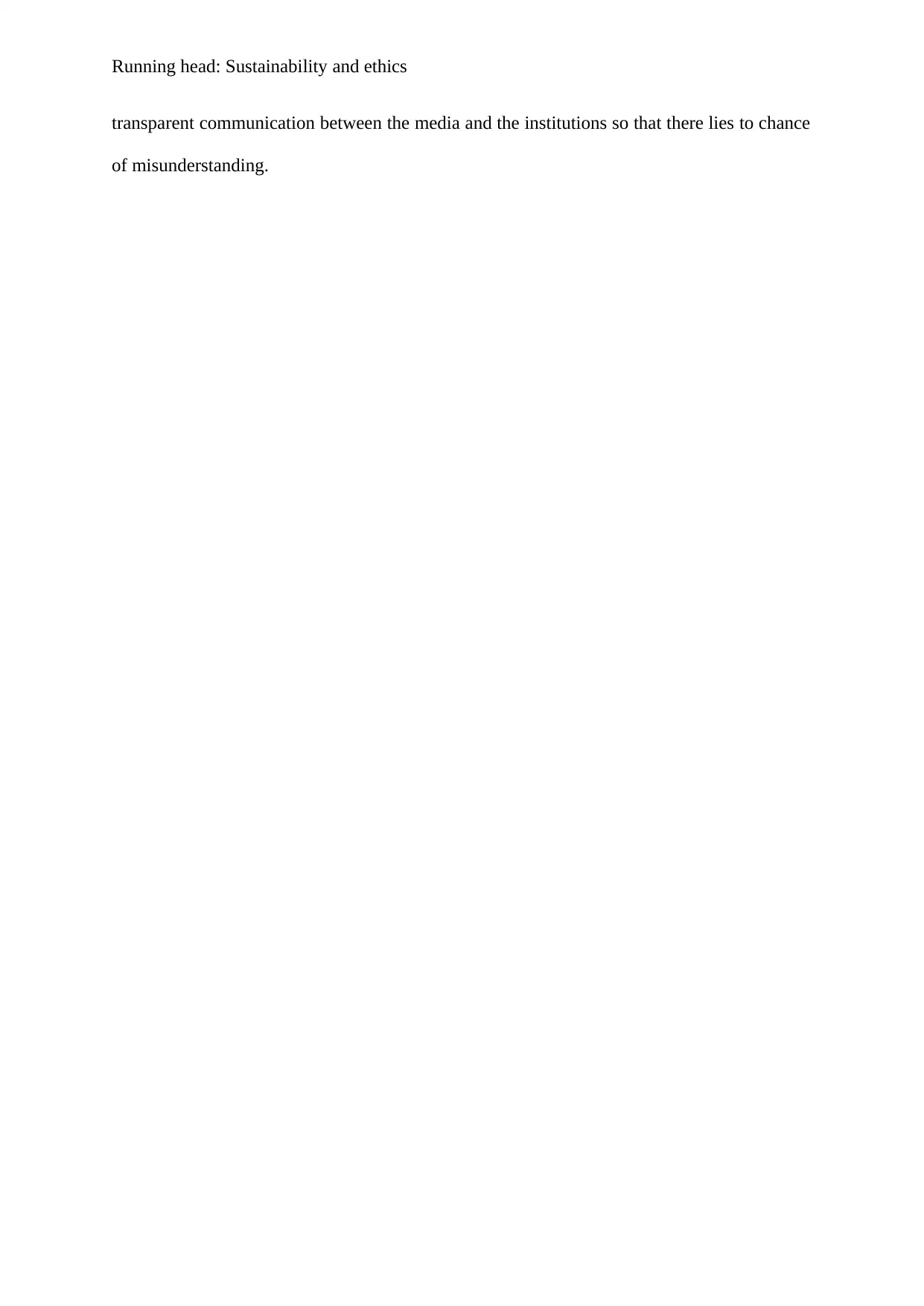
Running head: Sustainability and ethics
transparent communication between the media and the institutions so that there lies to chance
of misunderstanding.
transparent communication between the media and the institutions so that there lies to chance
of misunderstanding.
⊘ This is a preview!⊘
Do you want full access?
Subscribe today to unlock all pages.

Trusted by 1+ million students worldwide
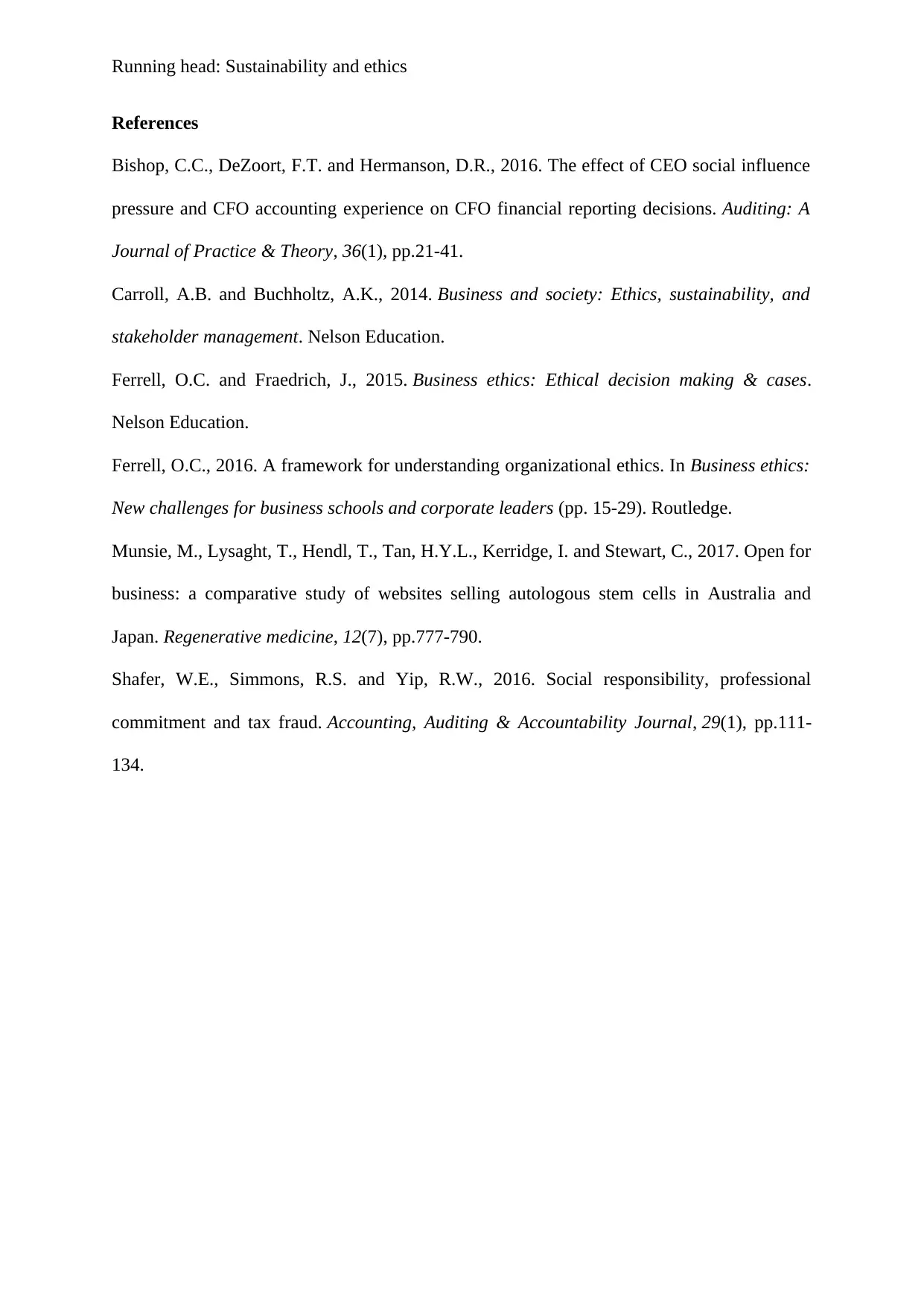
Running head: Sustainability and ethics
References
Bishop, C.C., DeZoort, F.T. and Hermanson, D.R., 2016. The effect of CEO social influence
pressure and CFO accounting experience on CFO financial reporting decisions. Auditing: A
Journal of Practice & Theory, 36(1), pp.21-41.
Carroll, A.B. and Buchholtz, A.K., 2014. Business and society: Ethics, sustainability, and
stakeholder management. Nelson Education.
Ferrell, O.C. and Fraedrich, J., 2015. Business ethics: Ethical decision making & cases.
Nelson Education.
Ferrell, O.C., 2016. A framework for understanding organizational ethics. In Business ethics:
New challenges for business schools and corporate leaders (pp. 15-29). Routledge.
Munsie, M., Lysaght, T., Hendl, T., Tan, H.Y.L., Kerridge, I. and Stewart, C., 2017. Open for
business: a comparative study of websites selling autologous stem cells in Australia and
Japan. Regenerative medicine, 12(7), pp.777-790.
Shafer, W.E., Simmons, R.S. and Yip, R.W., 2016. Social responsibility, professional
commitment and tax fraud. Accounting, Auditing & Accountability Journal, 29(1), pp.111-
134.
References
Bishop, C.C., DeZoort, F.T. and Hermanson, D.R., 2016. The effect of CEO social influence
pressure and CFO accounting experience on CFO financial reporting decisions. Auditing: A
Journal of Practice & Theory, 36(1), pp.21-41.
Carroll, A.B. and Buchholtz, A.K., 2014. Business and society: Ethics, sustainability, and
stakeholder management. Nelson Education.
Ferrell, O.C. and Fraedrich, J., 2015. Business ethics: Ethical decision making & cases.
Nelson Education.
Ferrell, O.C., 2016. A framework for understanding organizational ethics. In Business ethics:
New challenges for business schools and corporate leaders (pp. 15-29). Routledge.
Munsie, M., Lysaght, T., Hendl, T., Tan, H.Y.L., Kerridge, I. and Stewart, C., 2017. Open for
business: a comparative study of websites selling autologous stem cells in Australia and
Japan. Regenerative medicine, 12(7), pp.777-790.
Shafer, W.E., Simmons, R.S. and Yip, R.W., 2016. Social responsibility, professional
commitment and tax fraud. Accounting, Auditing & Accountability Journal, 29(1), pp.111-
134.
Paraphrase This Document
Need a fresh take? Get an instant paraphrase of this document with our AI Paraphraser
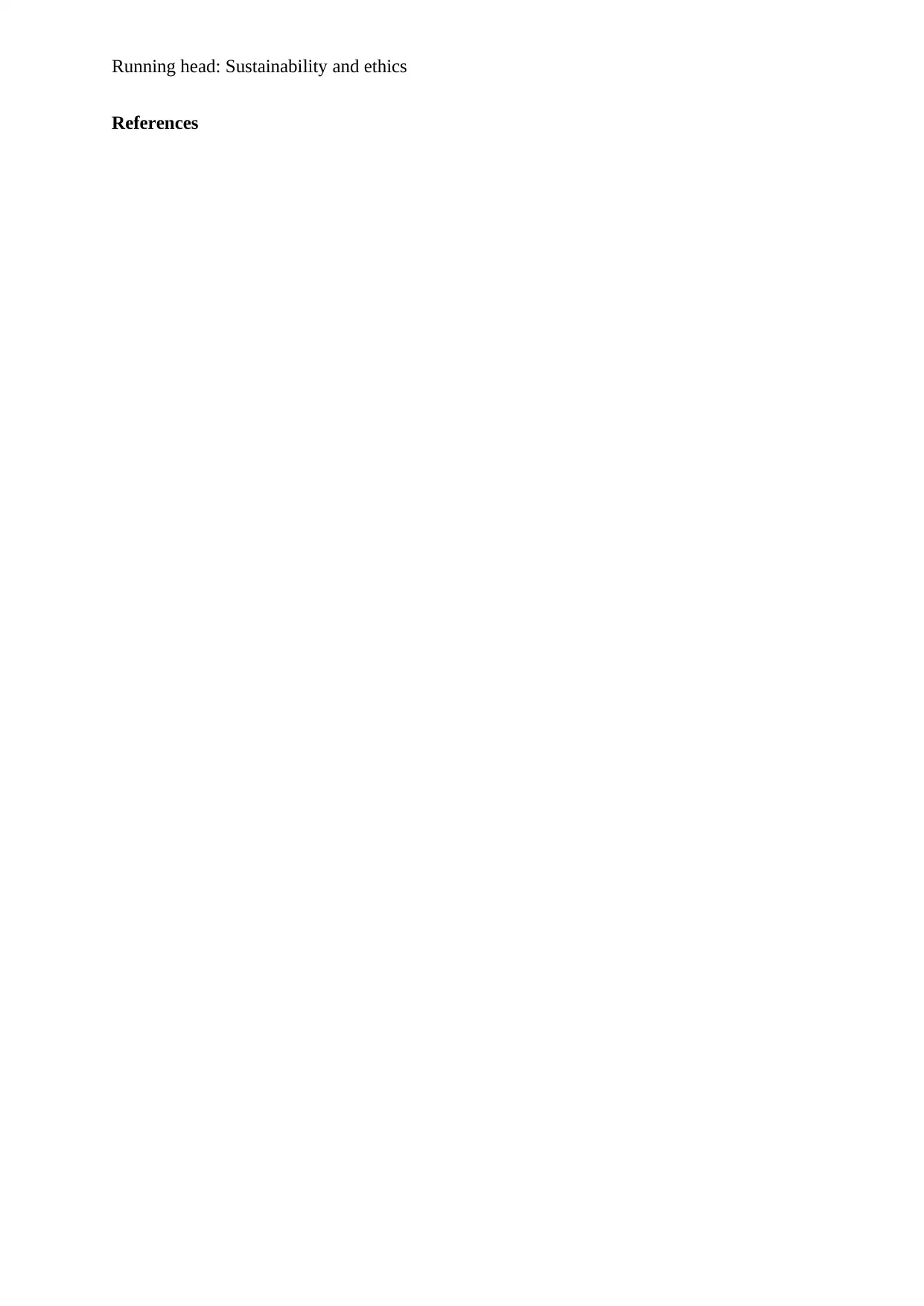
Running head: Sustainability and ethics
References
References
1 out of 8
Related Documents
Your All-in-One AI-Powered Toolkit for Academic Success.
+13062052269
info@desklib.com
Available 24*7 on WhatsApp / Email
![[object Object]](/_next/static/media/star-bottom.7253800d.svg)
Unlock your academic potential
Copyright © 2020–2026 A2Z Services. All Rights Reserved. Developed and managed by ZUCOL.





